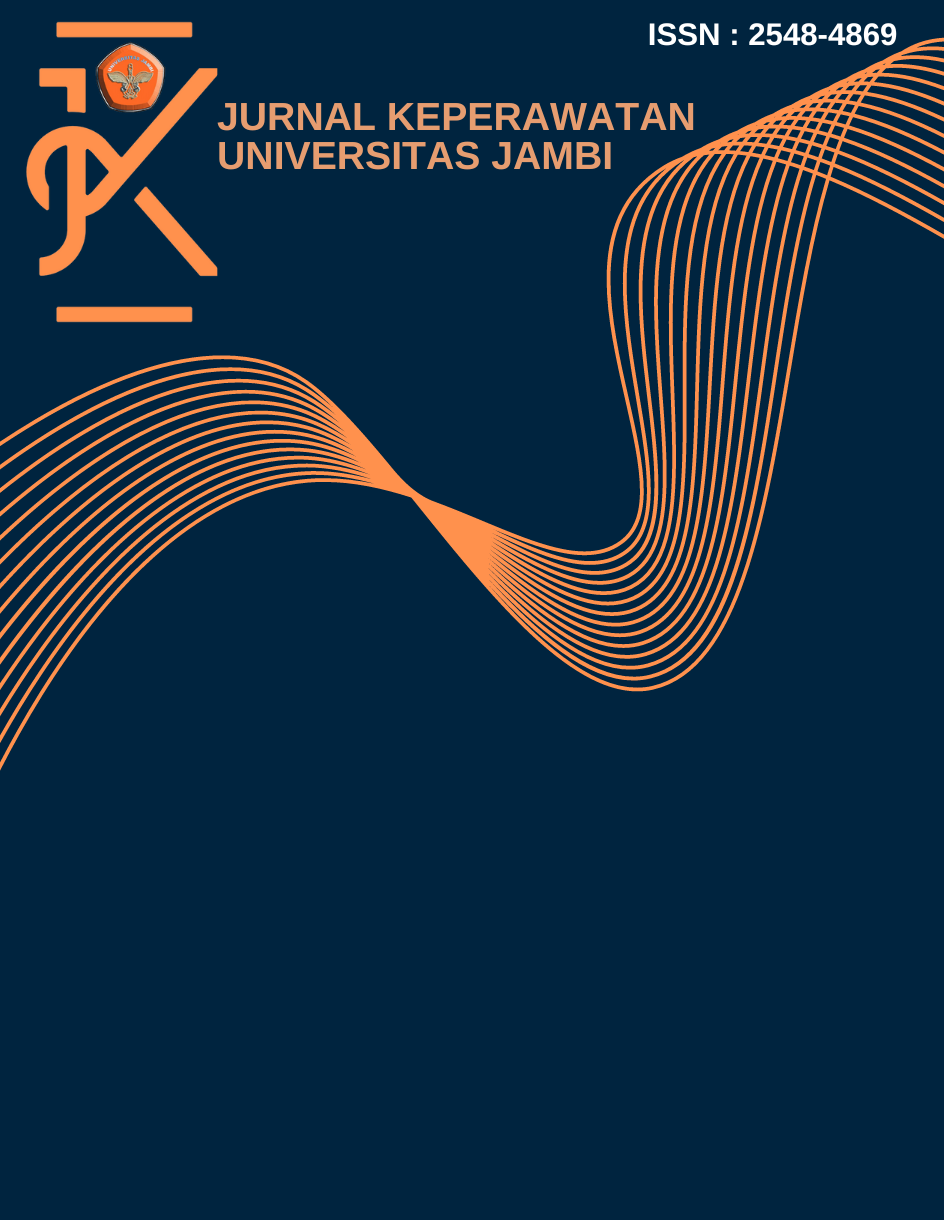The FAMILY NURSING ASSISTANCE Mr. G WITH HYPERTENSION PROBLEMS IN Mrs. H THE GIVING OF MENTIMUN JUICE
DOI:
https://doi.org/10.22437/jkuj.v8i1.19828Keywords:
Asuhan Keperawatan, Dokumentasi, Motivasi, PerawatAbstract
Hypertension is also referred to as a non-communicable disease, because hypertension is a chronic disease that cannot be transmitted to other people. This study aims to understand and learn about nursing care in families with hypertensive clients at Garuda Bagan Pete Housing. The results of the assessment on the client found the main complaint was lack of knowledge in families with hypertension. Planning and implementation are supported by supporting facilities and means and evaluation is carried out properly. The results of the final evaluation on Mrs. H with hypertension are the family's inability to recognize family health problems. At the beginning of the study Mrs. H said she did not know about hypertension and how to treat hypertension sufferers. After being implemented for 5 meetings, namely the family was given health education about hypertension and how to treat hypertension sufferers, now Mrs. H's family is able to understand hypertension and is able to care for hypertension sufferers. And after implementing the cucumber juice intervention Mrs. H's blood pressure decreased from 160/90 mmHg to 120/90 mmHg.Downloads
References
LITERATURE
1. Adler, M. A. and Lenz, K. (2023) THE CHANGING FACES OF FAMILIES: Diverse Family Forms in Various Policy Contexts. doi: 10.4324/9781003193500.
2. Al-Makki, A. et al. (2022) ‘Hypertension pharmacological treatment in adults: A world health organization guideline executive summary’, Hypertension, 79(1), pp. 293–301. doi: 10.1161/HYPERTENSIONAHA.121.18192.
3. Arslan, A. (2023) ‘Characteristics, types and functions of family concept’, African Educational Research Journal, 11(1), pp. 45–48. doi: 10.30918/aerj.111.23.001.
4. Ayu, S. A. et al. (2024) ‘Peran Kemandirian Kesehatan Keluarga Terhadap Kontrol Diri pada Individu Penderita Hipertensi’, MAHESA: Malahayati Health Student Journal, 4(3), pp. 907–927. doi: 10.33024/mahesa.v4i3.13921.
5. Dewi, S. and Familia, D. (2010) Hidup Bahagia dengan Hipertensi. Edited by Aplus. Yogyakarta.
6. Hariani, K. et al. (2025) ‘Evaluasi Penggunaan Obat Antihipertensi pada Pasien Tulang Bawang’, Jurnal Kesehatan, 8(1), pp. 214–223.
7. Inoue, R. et al. (2024) ‘Concept Analysis of Family Nursing Practice by Certified Nurse Specialists in Family Health Nursing’, International Journal of Nursing & Clinical Practices, 11
8. Jensen, T. M. and Sanner, C. (2021) ‘A scoping review of research on well-being across diverse family structures: Rethinking approaches for understanding contemporary families’, Journal of Family Theory and Review, 13(4), pp. 463–495. doi: 10.1111/jftr.12437.
9. Keperawatan Tn Khususnya Tn Y dengan Stroke Buletin Kesehatan, A. Y., Firsty, L. and Syamsiah, D. (2017) ‘Asuhan Keperawatan Keluarga Tn. Y dengan Stroke’, Buletin Kesehatan.
10. Kusnul, Z. and Munir, Z. (2011) ‘Efek Pemberian Jus Mentimun Terhadap Penurunan Tekanan Darah’, Jurnal Ilmiah Keperawatan, 1, pp. 1–5.
11. Li’wuliyya, S. (2024) ‘Alternatif Pilihan Intervensi Non-Farmakologi Terhadap Penurunan Tekanan Darah Penderita Hipertensi: Systematic Review’, Quality: Jurnal Kesehatan, 18(1), pp. 27–38. doi: 10.36082/qjk.v18i1.1247.
12. Lovindy, P. L., T. M. (no date) ‘Pengaruh Pemberian Jus Mentimun (Cucumis Sativus L.) Terhadap Tekanan Darah Sistolik dan Diastolik’, Semarang: Universitas Diponegoro.
Downloads
Published
How to Cite
Issue
Section
License
Copyright (c) 2024 Rivi Maldanurman Putri, Indah Mawarti, Andika Sulistiawan

This work is licensed under a Creative Commons Attribution 4.0 International License.






